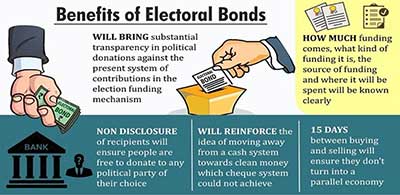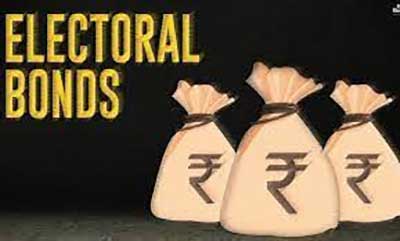Relevance: GS-3: Government policies and interventions for development.
Key phrases: Electoral bond, RBI, SBI, ECI, political parties, RPA act 1951
Why in News?
- Ahead of assembly elections in five States, the government on Thursday approved the issuance of the 19th tranche of electoral bonds, which will be open for sale from January 1 to 10.
What is Electoral Bond?
- An electoral bond is like a promissory note that can be bought by any Indian citizen or company incorporated in India from select branches of State Bank of India.
- The citizen or corporate can then donate the same to any eligible political party of his/her choice.
- The bonds are similar to bank notes that are payable to the bearer on demand and are free of interest.
- An individual or party will be allowed to purchase these bonds digitally or through cheque.
- The electoral bonds were introduced with the Finance Bill (2017). On January 29, 2018 the Narendra Modi-led NDA government notified the Electoral Bond Scheme 2018.
- SBI is the only authorised bank to issue such bonds.

Advantages of Electoral Bonds:
- All electoral bonds issued are to be redeemed by a bank account that the Election Commission of India has disclosed; hence the malpractice is strengthened.
- The widespread use of electoral bonds can help to hold back political parties who operate with the goal of simply collecting funds from the public. It is because only registered parties attaining at least 1% of the votes in the general election can receive electoral funding.
- Electoral bonds work with the government goal to make election funding entirely safe and digitized. Therefore, any donation going above RS 2000 is not legally required to be in the form of electoral bonds and cheques.
- All transactions of electoral bonds are carried out via cheques or digitally.

Challenges With the Electoral Bonds:
- Problem of Anonymity: The scheme has also been criticised for the manner in which it was structured. It is said that the removal of a limit on corporate donations that existed earlier, and allowed donation of only 7.5% of three-year average net profit, has since allowed businesses to make anonymous political donations.
- Against Democracy: Through an amendment to the Finance Act 2017, the Union government has exempted political parties from disclosing donations received through electoral bonds. This means the voters will not know which individual, company, or organization has funded which party, and to what extent.
- Opaqueness The Amendments to RPA 1951 allowed political parties not to report ECI the donations received through electoral bonds. This reduces the transparency in political parties. Further, it hampers public scrutiny in democracy.
- Against Right to Know: The Indian Supreme Court has long held that the “right to know”, especially in the context of elections, is an integral part of the right to freedom of expression under the Indian Constitution. By keeping this knowledge from citizens and voters, the electoral bonds scheme violates fundamental tenets of our democracy.
- Institutionalizing Corruption: Removal of a limit on corporate donations that existed earlier Incentive the Institutionalizing Corruption.
- ‘Majority of funding from unknown sources’: According to report by ADR in August this year had stated that over 70% of the income of the political parties was coming through unknown sources, including electoral bonds.
What is the Election Commission’s stand on electoral bonds?
- The Election Commission, in its submission to the Standing Committee on Personnel, Public Grievances, Law and Justice in May 2017, had objected to the amendments in the Representation of the People (RP) Act,which exempt political parties from disclosing donations received through electoral bonds.
- It described the move as a “retrograde step”. In a letter written to the Law Ministry the same month, the Commission had even asked the government to “reconsider” and “modify” the above amendment.
- Asking the government to withdraw the new provison, the EC had written, “In a situation where the contribution received through electoral bonds are not reported, on perusal of the contribution report of political parties, it cannot be ascertained whether the political party has taken any donation in violation of provision under Section 29(b) of the RP Act which prohibits the political parties from taking donations from government companies and foreign sources.”
Way Forward:
- The Preamble of the Constitution declares India to be a Democratic Republic. Democracy is sustained by free and fair elections. Only free and fair elections to the various legislative bodies in the country can guarantee the growth of a democratic polity.
- There is a need for effective regulation of political financing along with bold reforms to break the vicious cycle of corruption and erosion of quality of democratic polity.
- It is crucial to plug the loopholes in the current laws to make the entire governance machinery more accountable and transparent. Unless drastic and radical steps are taken to cleanse public offices by the government, political parties and people at large, corruption will continue to corrode the vitals of the country
Source: The Hindu
Mains Question:
Q. Ahead of assembly elections in five States, the government has approved the issuance of the 19th tranche of electoral bonds. What do you understand by Electoral Bonds ? Has its introduction brought any transparency in funding of political parties? Critically analyse.








